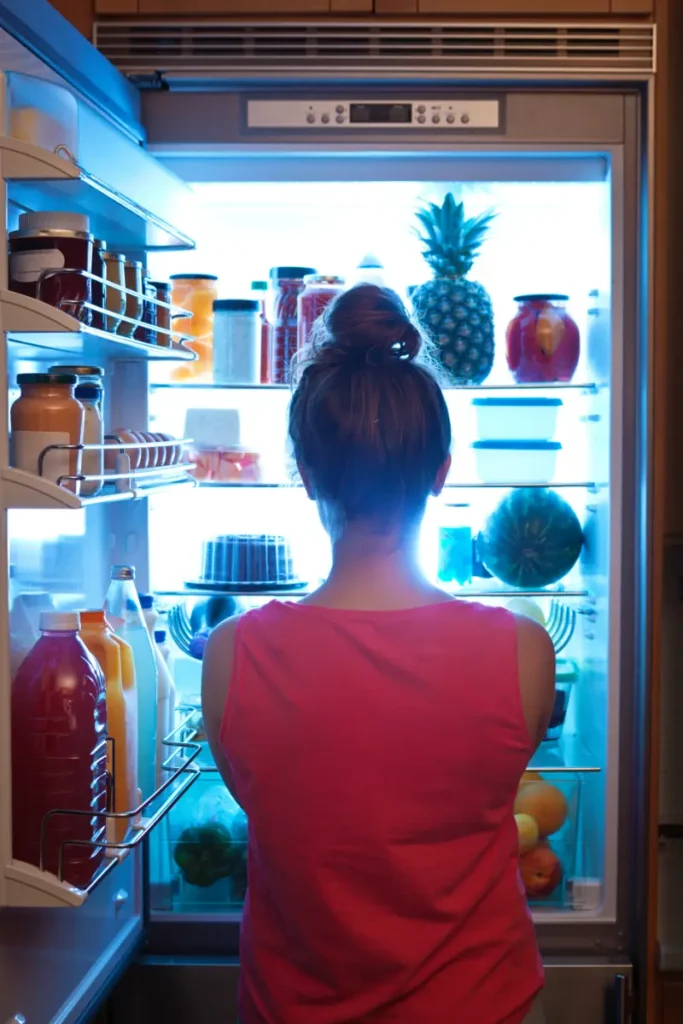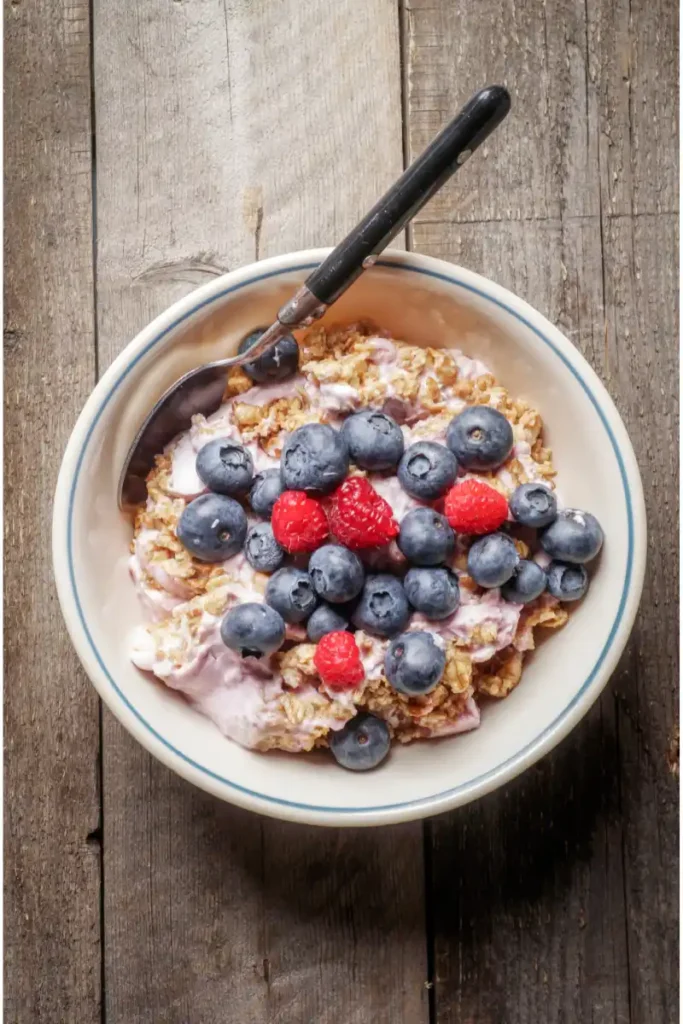The appeal of late-night food is undeniable, evoking scenes of secretive refrigerator rendezvous, containers filled with oily delights, and a possible sense of regret. But what drives this magnetic pull towards the pantry or fridge in the dead of night, leading our hunger to surge and self-control to falter? What compels us to head towards the kitchen, even when dinner seemed to have filled us completely?
In this comprehensive exploration of late-night food, we’ll delve into the biological and cultural factors that drive our after-hours cravings. We’ll navigate the tricky terrain of healthy snacking versus indulgent treats, offering practical tips for making smart choices regardless of the hour. We’ll also address the potential health consequences of late-night eating and how to mitigate them, ensuring that your midnight feasts don’t turn into a nutritional nightmare.
So, grab your favorite snack (we won’t judge!), settle in, and join us as we unravel the mysteries of late-night food.
The Allure of Late Night Food
Why Do We Crave Food at Night?
While the answer may seem simple – we’re hungry! – the reasons behind late-night cravings are surprisingly complex. Our bodies are governed by a delicate interplay of hormones that regulate hunger and satiety. Ghrelin, the “hunger hormone,” tends to increase in the evening, while leptin, the “satiety hormone,” decreases. This hormonal shift can leave us feeling peckish even after a substantial dinner.
But it’s not just biology at play. Late-night eating can also be triggered by psychological and emotional factors. Stress, boredom, loneliness, and even certain television shows can send us running to the pantry for comfort. Additionally, sleep deprivation can disrupt our hormonal balance, further fueling those late-night cravings.
The Cultural Significance
Late-night food isn’t just a personal indulgence; it’s often woven into the fabric of our social and cultural experiences. Think of college students bonding over late-night pizza or friends gathering for a midnight ramen feast. In many cultures, late-night street food vendors are a vibrant part of the culinary landscape, offering everything from savory dumplings to sweet treats.
Popular culture also plays a role in shaping our perceptions of late-night eating. Countless movies and TV shows depict characters indulging in midnight snacks, often portraying it as a fun and rebellious act.
Understanding the complex interplay of biological, psychological, and cultural factors can help us approach late-night food with more awareness and make informed choices that align with our health and well-being.
Navigating Late Night Food Choices
Now that we’ve explored the reasons behind our late-night cravings, let’s talk about making smart choices when hunger strikes after hours. Whether you’re a health-conscious individual or simply looking to indulge without derailing your diet, there are strategies and options for everyone.
Healthy Late Night Snacks for Every Craving
Not all late-night snacks are created equal. Instead of reaching for chips or cookies, consider these healthier alternatives that will satisfy your cravings and nourish your body:
- Protein-rich snacks: Greek yogurt, cottage cheese, hard-boiled eggs, or a handful of nuts can help curb hunger and promote muscle repair.
- Fiber-filled options: Fruits like berries and apples, vegetables like carrots and celery, or air-popped popcorn can keep you feeling full without adding excessive calories.
- Nutrient-dense choices: A small bowl of oatmeal with berries, a slice of whole-wheat toast with avocado, or a smoothie made with fruits and leafy greens can provide essential vitamins and minerals.
- Low-calorie snacks: If you’re watching your calorie intake, opt for sugar-free gelatin, cucumber slices with a sprinkle of lime and chili powder, or a cup of herbal tea.
Smart Strategies for Ordering Late Night Takeout
Sometimes, only takeout will hit the spot. Here’s how to navigate late-night delivery menus without sacrificing your health goals:
- Choose restaurants with healthy options: Look for places that offer grilled chicken, fish, or vegetable-based dishes.
- Opt for smaller portions and sharing dishes: This helps with portion control and prevents overeating.
- Customize your order: Ask for less oil, sauce on the side, and whole-wheat options whenever possible.
- Avoid sugary drinks: Stick with water to stay hydrated without adding unnecessary calories.
Hacks for Home Cooks
If you enjoy cooking, whipping up a quick and healthy late-night snack is a great way to satisfy your cravings and control the ingredients. Here are some ideas:
- Quick and easy recipes: Scrambled eggs with spinach and cheese, a simple fruit salad, or homemade air-popped popcorn are all easy to prepare and require minimal cleanup.
- Utilizing leftovers and pantry staples: Leftover roasted vegetables, canned beans, or lentils can be transformed into delicious and nutritious snacks.
- Prepping healthy snacks in advance: Hard-boil eggs, cut-up vegetables, or portion-out nuts and seeds to have healthy options readily available.
- Avoiding processed and sugary ingredients: Opt for whole foods and natural sweeteners like honey or maple syrup whenever possible.
Remember, late-night eating doesn’t have to be synonymous with unhealthy choices. By planning and having healthy options on hand, you can satisfy your cravings without sacrificing your health goals.
Balancing Late Night Eating with Health
While indulging in late-night food occasionally isn’t necessarily detrimental, consistently eating late at night can have potential health consequences. It’s important to be aware of these risks and adopt strategies to minimize them.
The Potential Health Risks of Late Night Eating
Here are some potential downsides to consider:
- Impact on sleep quality and circadian rhythm: Eating late can disrupt your sleep cycle, leading to insomnia or restless sleep. This is because the digestive process can interfere with the production of sleep hormones like melatonin.
- Increased risk of weight gain and metabolic disorders: Late-night eating often involves high-calorie, processed foods, which can contribute to weight gain. Additionally, eating late can disrupt your metabolism and increase your risk of developing conditions like diabetes and heart disease.
- Potential for digestive issues and heartburn: Eating a heavy meal before lying down can lead to indigestion, heartburn, and acid reflux.
Tips for Minimizing the Negative Effects of Late Night Eating
If you find yourself frequently reaching for food after hours, here are some tips to minimize the potential negative effects:
- Eat a balanced and nutritious dinner: Ensure your dinner includes protein, healthy fats, and complex carbohydrates to keep you feeling full and satisfied throughout the evening.
- Practice mindful eating and portion control: Pay attention to your hunger cues and avoid mindless snacking. Choose smaller portions and savor your food slowly.
- Avoid eating directly before bedtime: Give your body time to digest your food before lying down. Ideally, avoid eating anything for at least 2-3 hours before bedtime.
- Maintain good sleep hygiene: Establish a regular sleep schedule, create a relaxing bedtime routine, and ensure your bedroom is dark, quiet, and cool.
When to Seek Professional Help
If you find yourself struggling to control your late-night eating habits, it’s important to seek professional help. This is especially crucial if you experience any of the following:
- Signs of disordered eating: This can include binge eating, purging, or restricting food intake.
- Emotional eating: If you find yourself Using food as a source of comfort or as a way to cope. with stress, anxiety, or other challenging emotions, it’s crucial to address the underlying emotional issues.
- Significant weight gain or other health concerns: If your late-night eating habits are impacting your physical health, it’s crucial to seek professional guidance.
A registered dietitian can help you develop a personalized nutrition plan that addresses your late-night cravings and supports your overall health goals. Additionally, a therapist can help you explore the emotional triggers behind your eating habits and develop coping mechanisms to manage them effectively.
Remember, late-night eating doesn’t have to be a battle. By understanding the potential risks and adopting healthy strategies, you can enjoy your after-hours snacks without compromising your well-being.
FAQs
Late-night eating is a common phenomenon, and with it comes a slew of questions and concerns. Here, we address some frequently asked questions to help you navigate the world of after-hours cravings:
What can I make for late night cravings?
For late night cravings, you can make something quick and satisfying that won’t disrupt your sleep. Options like popcorn, a small bowl of whole-grain cereal with milk, Greek yogurt with honey and fruits, or a piece of toast with avocado are excellent choices. These options are light on the stomach yet fulfilling enough to satisfy your cravings.
what is the best thing to eat for a late dinner?
The best thing to eat for a late dinner is something light and easy to digest. Meals like grilled chicken or fish with steamed vegetables, a hearty salad with a good balance of proteins and fats (like nuts, seeds, or cheese), or a simple soup with lots of vegetables and some protein are ideal. These meals provide nourishment without overloading your digestive system late at night.
what is called midnight food?
Midnight food often referred to as a “midnight snack,” is typically a light snack or meal eaten late at night or during the midnight hours. People choose midnight food based on personal preference, but it generally includes easy-to-prepare and digestible items like sandwiches, fruits, nuts, yogurt, or leftovers from dinner. The key is to keep it light to avoid sleep disturbances.
Is late night eating bad for you?
Occasional late-night snacking isn’t necessarily harmful. However, consistently eating late at night can disrupt your sleep, metabolism, and weight management efforts. The key is to make mindful choices and prioritize healthy options.
What are the best late night snacks for weight loss?
Focus on snacks that are high in protein and fiber, which promote satiety and prevent overeating. Some good options include Greek yogurt, cottage cheese, fruits, vegetables, and air-popped popcorn.
How can I stop craving food at night?
Addressing the root cause of your cravings is crucial. Ensure you’re eating a balanced and filling dinner, manage stress effectively, and prioritize good sleep hygiene. If emotional eating is a factor, consider seeking support from a therapist.
What are some healthy late night meal options?
If you’re truly hungry for a late-night meal, opt for lighter options like a small bowl of oatmeal with fruit, a vegetable-based soup, or a lean protein like grilled chicken or fish with roasted vegetables.
Can late night eating affect my sleep?
Yes, eating late can disrupt your sleep cycle by interfering with the production of sleep hormones and causing digestive discomfort. Ideally, avoid eating anything for at least 2-3 hours before bedtime.
Remember, late-night food doesn’t have to be the enemy. By making informed choices and listening to your body’s cues, you can navigate your after-hours cravings without sacrificing your health and well-being.
Late-Night Food and Social Gatherings
Late-night food often goes hand-in-hand with social gatherings. Whether it’s a movie night with friends, a board game marathon, or a celebratory get-together, sharing food is a way to connect and create memories. However, social settings can sometimes present challenges to healthy eating, especially when tempting snacks and treats are readily available.
Here are some tips for navigating late-night food choices in social situations:
- Offer to bring a healthy dish: This way, you can ensure there’s at least one nutritious option available. Consider bringing a vegetable platter with hummus, a fruit salad, or homemade protein bars.
- Focus on socializing, not just eating: Engage in conversations, play games, and enjoy the company of your friends and family. Mindful eating becomes more challenging when you’re distracted, so make a conscious effort to savor your food and pay attention to your hunger cues.
- Practice portion control: It’s easy to overeat when surrounded by tempting snacks. Use a small plate and be mindful of your portions.
- Make smart swaps: If there are unhealthy options available, try to find healthier alternatives. For example, choose baked chips over fried, or opt for fruit instead of sugary desserts.
- Don’t deprive yourself: Restricting yourself completely can lead to overindulging later. Allow yourself to enjoy small portions of your favorite treats in moderation.
Remember, social gatherings are about connecting with loved ones, not just about the food. By making mindful choices and prioritizing healthy options, you can enjoy late-night food with friends and family without sacrificing your health goals.
Conclusion: Late-Night Food – A Matter of Balance and Mindfulness
Late-night food, with its allure and potential pitfalls, is a topic that sparks endless debate. While it’s not inherently bad, consistently indulging in unhealthy choices after hours can have negative consequences for our health and well-being.
The key to navigating the world of late-night food lies in finding a balance between indulgence and mindful eating. By understanding the biological and psychological factors that drive our cravings, we can make informed choices that satisfy our hunger without sacrificing our health goals.
Whether you reach for a healthy snack, whip up a quick and nutritious meal, or occasionally treat yourself to takeout, remember to prioritize quality ingredients, portion control, and mindful eating practices.
Ultimately, late-night food can be enjoyed as part of a healthy and balanced lifestyle. By making conscious choices and listening to our bodies, we can satisfy our after-hours cravings without guilt or regret.
More Delicious Recipes:
- Patacones: Craving something crunchy and satisfying? Dive into the world of Patacones, the twice-fried plantain slices that are a staple in Latin American cuisine. Perfect as a snack or side dish, these golden discs are a delicious testament to the simple pleasures of cooking. Discover our step-by-step recipe that guarantees crispy perfection.
- Mini pumpkin pies: Embrace the essence of fall any time of the year with our Mini Pumpkin Pies. These bite-sized delights pack all the flavors of the classic dessert into a personal treat just for you. Whether you’re hosting a dinner party or just looking to treat yourself, these pies are sure to impress.





1 thought on “Late Night Food: Satisfy Your After-Hours Cravings”